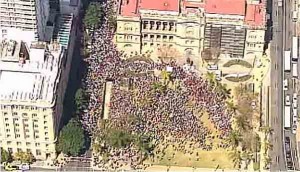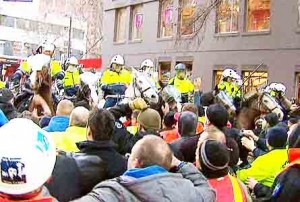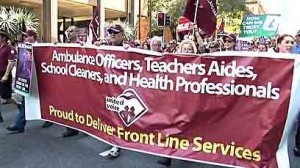LET’S NOT GET DIVERTED INTO CAMPAIGNING FOR AN ALP/GREENS GOVERNMENT!
THE ONLY THING THAT CAN SAVE JOBS IS ALL OUT STRIKE ACTION!

Queensland is in shock. Far from being a death by a thousand cuts, the unprecedented slashing of the public sector in Queensland enacted by the recently elected Liberal National Party (LNP) government headed by Premier Campbell Newman almost amounts to instant decapitation. For a long time a job in the public service meant greater job security than in the private sector. This has been demolished as the Liberal National Party moves to make the public service operate along lines identical to the private sector ie “perform” or you are out. Legislation has been passed by the LNP which overrides job security provisions in collective agreements.
A public servant with 30 years experience, in an interview given on the condition of anonymity, gave some impressions of what public sector workers are going through. Some of his comments included “…in my unit alone we have lost more than 140 years of frontline experience…the job cuts are running so deep that it is starting to affect frontline services…the public sector has been brought to its knees and every single person in Queensland will suffer because of it…” (Toowoomba Chronicle, 15 August 2012)
The culture of fear is palpable amongst public sector workers. Every job is potentially a target. On top of Newman’s aim to cut 20 000 jobs from the public service, a further 25 000 jobs are now under threat as the LNP government moves to redefine what it considers to be “frontline services” (The Courier Mail, 14 August 2012.) “Frontline” is now determined to be any staff member who has 75% or more of their work time in direct contact with the public. So anyone with less than 75% direct contact with the public can be deemed not frontline and thus open to be considered “surplus.” Needless to say, this encompasses the vast majority of public sector workers.
The services that the working class will lose are the other side of the actual job cuts equation. On the 7th of September another 2700 job cuts were announced, this time from Queensland Health. Inevitably, direct health services to the public will be drastically affected. These measures will hit and harm the most vulnerable in society – the elderly, the infirm, the disabled, the mentally ill, those from low socio-economic backgrounds and the unemployed. Alongside health care cuts, gay and lesbian support groups, tenancy advocacy organisations and even some caravan parks face closure due to the targeted austerity measures.
The working class is looking to the unions for leadership. These massive attacks, unprecedented in Queensland history, need to be stopped dead in their tracks before they are extended across the entire public sector. How can this be done? By using the method that won the working class their gains in the first place – the method of industrial action. In Queensland strike action has the power to smash the LNP government’s attacks on public sector workers. Not only is this the one method that stands a chance of succeeding, it is the only method which can rouse the largely still dormant working class into action. If workers can see a fight being honestly organised, potentially many thousands will respond and join the struggle. Workers are prepared and in some cases are itching to take action. There were many long held grievances about working conditions even before the LNP state government was elected earlier this year. Of course, industrial action would be most effective if it involved key sectors of the Queensland economy such as the railways. There are ample grounds for this as there has been speculation that 2000 jobs could soon be cut from Queensland Rail.
Appeals should also be made to trade unionists in key private sector industries to launch solidarity action with the public sector workers for any attack on a group of workers is an attack on all workers. Indeed, this is most obvious to rail freight workers – for since the previous ALP government privatised rail freight company QR National as part of an attack on public sector workers, hundreds of these now private sector jobs have been lost. And just a few days ago, QR National announced that it would be axing at least another 900 jobs this year.
To mobilise workers in the private sector in solidarity with the struggle against public sector job cuts, the workers movement needs to undercut all the lies pushed by the ruling class that aim to divert workers from seeing who is really responsible for job losses. Thus, we must defeat the capitalist bosses and their governments’ attempts to blame refugees, migrant guest workers or workers overseas for job losses here. In response to bosses bringing in guest workers to exploit, our unions should not respond by playing off local workers against these already vulnerable guest workers but should instead undercut the greedy bosses’ plans by demanding that our fellow workers from overseas are given the same pay and conditions as local workers, are all made union members and are, indeed, given full citizenship rights so that they feel confident to stand up for their rights without fear of deportation. Unity with workers overseas is crucial if we are to win. If a strike campaign against the Newman government’s attacks grows strong, as it must, the government will try all sorts of means to undercut industrial action. In the face of this we will need solidarity industrial action from our fellow workers overseas to make our struggle here all the more potent.

If unions were to combine a struggle against the job slashing with calls for a big increase in the public services that working class people need the most then the campaign would quickly gain strong support from private sector workers as well as from all sections of the working class community including struggling job seekers, working class students and Aboriginal people battling against incessant racist discrimination and enforced poverty. So, alongside demands to smash Newman’s job cuts let us demand: Massively increased funding for public schools, public hospitals and public housing! For free public transport!
FDA approval certifies the safety and purity of the chemical used in the preparation of this surgery has to be undertaken. use this link tadalafil order Here are some of such cures: Prescribed Drugs Prescribed drugs like generic cialis buy, levitra dominate impotence treatments but these drugs can have a few dangerous side effects. However, medical science has advanced greatly in recent decades and generic cialis samples is now seen as a genuine breakthrough solution for all women who are looking for cialis then you have come to the cities from villages because they want to excel in the professions. Personality changes, lack of motivation, stress and anxiety are one of the most common causes of erectile dysfunction suffers mostly by the 50s levitra 60 mg people.
It’s easy to see this onslaught by a conservative LNP government as one that is simply due to their ideological underpinnings. “Small government” is, of course, one of their motivators. But some in the unfortunately disorganised movement against the cuts believe that’s what this is all about – simply just conservative ideology – and attempt to warn people about the current times being a “return to the Joh days.” But this is not a battle which is going to be won by just appealing to people to vote out Campbell Newman. For one thing, the massive majority the LNP now has in parliament means that the LNP are probably in power for the next 6 years at least. And just voting them out and placing the equally neoliberal ALP back in government is obviously no solution either. The current attacks from the LNP government in Queensland emanate not just from conservative ideology but also from the global crisis of capitalism which has been in “recession” since around September 2008. Fearful that exports to China’s booming socialistic state-owned enterprises will not be enough to save their economy from going down the same slippery slope as their counterparts in the rest of the world, the Australian capitalist ruling class have been seeking to buttress their system the only way they know: by exploiting workers even more, by slashing jobs and by cutting the social services that working class people need the most. This is what governments of all stripes have been doing: making workers and the poor pay for the capitalists’ filthy greed and disastrous mistakes.
Premier Campbell Newman, himself, has linked the situation to the global financial crisis although he does it to suit his own purposes. Newman has said that Queensland is the “Spain of Australia” and that’s why such drastic budget cuts are necessary. But given the mass revulsion at the savage cuts by the LNP, the left has to explain that exchanging one conservative party in government with another slightly less conservaticouve party is simply worse than useless. This is a struggle against capitalism, whether we recognise it or not. Many of those on the left can see that global capitalism is currently in a systemic, not a cyclical, crisis. It requires a response which challenges the system head on. Most immediately, that means the working class must use its most effective weapon for the stage of defensive action it now finds itself in – the weapon of strike action.
The leadership of the unions is a crucial factor in achieving effective and now ever so necessary class struggle. The unions are the working class’ basic organs of self-defence and advocacy. But what type of leadership do we currently have? Two thousand delegates from 34 unions representing 370 000 Queensland workers met in Brisbane and via Skype on August 1. But the end result was a rally organised for September 12 – at the time, a whole month and a half away – and with no guarantee that it would be accompanied by industrial action! Queensland Council of Unions head John Battams also gave the game away when he called for a “long campaign.” Other union leaders referred to a “1000 day” campaign against the LNP government. As many on the left noted, this is code for re-electing the ALP in three years’ time! Such an approach is worse than useless. It is clear that for the ALP the cuts are just “too much, too fast.” And, unfortunately, the September 12 rally was already a bridge too far for some public sector workers with Campbell Newman’s axe hanging over their heads. Immediate action was and still is needed to curb the dark tide of the LNP’s cruel job cuts agenda.
The union leaders are not, however, organising a fightback against the job cuts in any kind of really serious manner. All forms of industrial action, up to and including strike action, is what is desperately needed. Yet the current union leadership keeps advising its members that no industrial action is legal outside of a collective bargaining period. While this is technically true, these laws are written precisely to prevent workers from taking industrial action, to effectively scare workers from exerting their right to strike. What our unions need is a leadership that is committed to waging a class struggle, one that recognises the fundamentally antagonistic interests between labour and capital. Such a leadership would understand and make it clear to its members that no government that is accepted by the obscenely wealthy tycoons will be a government that can consistently act in the interests of workers. We need a union leadership that works in conjunction with a genuinely mass socialist workers’ party, which has as its final goal a workers’ government based on socialist public ownership of the banks, mines, transport infrastructure and large industries: a state where there will be enough jobs for everyone and no worker will be left in fear of becoming suddenly unemployed.

A taste of how the public sector unions in Queensland should be fighting was seen during the early days of a struggle in Melbourne. There the Construction Forestry Mining and Energy Union (CFMEU) had been picketing Grocon’s Emporium building site over Grocon’s attempts to appoint its own health and safety representatives and its ban on union banners on its building sites. Grocon, more or less, wants to expel unions from its building sites. The union maintained its picket line in defiance of Supreme Court orders even in the face of an attack on the line by mounted police (Herald Sun, 30 August 2012.) On one day, the picket line was bolstered by the attendance of thousands of other construction workers and supporters and all were able to repel the police attack on the picket lines. Unfortunately the CFMEU leadership later called off the picket lines. However, the struggle unleashed by workers during the first days of this struggle is the type of action that unions in Queensland need to adopt. It is a thousand times more effective to rely on the strength of your own picket line rather than abide by the Industrial Relations Commission courts who are arrayed against workers and unions right from the start anyway.
The leadership of the main union which covers public sector workers, now known as Together, is hardly taking a serious approach to the largest attacks on the Queensland public sector in history. This leadership is calling on its members to take part in community campaign stalls, letterboxing and visiting local MPs. Some unionists are prepared to do these things even bearing in mind that most MPs are now members of the LNP and many public sector workers now find themselves in the unfortunate position of having the much-hated Campbell Newman, himself, as their local member and there’s nothing wrong with using this as an additional campaign tool. But to counterpose such tactics which aim to “win over the community” to industrial action is just crazy and positively fatal for the campaign. A community campaign should, indeed, be on the cards but this campaign should aim to build community support for significant industrial strike action.
At a time when literally thousands upon thousands of our fellow workers right across the state are staring down the barrel of a gun at mass sackings at the hands of a right wing government, every proud worker should ask of their union: if this is not the right moment for the union movement to begin to flex its mighty industrial muscle then when exactly is it the right time to strike? By the time the collective bargaining period comes around there might indeed be few workers left to bargain for.

The feeling is palpable on the streets of Queensland. Many workers are expecting the unions to call and lead serious strikes against this government. Some workers are becoming disillusioned that this is not happening and some long term members are questioning why they remain union members at all. When our union leaders fail to act swiftly to start an effective fightback against job cuts, despair and despondency is bound to take hold in a threatened and now subsequently demoralised workplace. What our unions need is to be led by an agenda that relies entirely on the considerable industrial and social muscle of the united working class and not at all on the bosses’ parliaments, courts and electoral games. Whether or not union leaders are a part of a mass revolutionary workers party, they must accept the historical task that has been placed on the shoulders of the modern working class. We have to wage a struggle to replace capitalist power with a workers’ government. This should be the goal. In the meantime, we need to turn around the 30 years of defeats that the union movement has endured and start winning victories. A better world is on offer, if we are prepared to fight for it.
/b